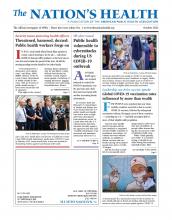As of this writing, there are approximately 93 million people in the U.S. who are eligible for COVID-19 vaccines yet aren’t vaccinated. There are varying reasons why people are not vaccinated, from those who don’t believe vaccines are useful or that they’re dangerous, to people who encounter barriers that prevent them from receiving the vaccines or who still have questions about them.
Most tragic are the people who are the victims of disinformation. This segment of the population is exposed to false information that is purposely fed through malicious sources, often for financial or political gain. This group, unknowingly perhaps, contributes to the dissemination of false information through their own networks, resulting in more misinformed people in the community.
It’s important to recognize that we in the public health field have not been as good at messaging as we could be. But what is alarming to me is how effective the disinformation networks have been.
These groups have not only focused on vaccines. The fact that we have groups in Indiana, Texas, Florida and other states vociferously fighting mask mandates in school classrooms is unconscionable. Many of these attitudes are nurtured by officials wrapping themselves in a flag of misguided patriotism that negates science, focuses exclusively on the individual and aims to shred to pieces what little remains of the social contract in this country.
But while the discussion over the use of masks is important, the most important goal here is to achieve a much higher vaccination rate. There is ample precedent for vaccination mandates in the U.S., dating back to the 1850s in Massachusetts. Legal challenges to such ordinances also go back to the early days of vaccines, but concern for the public’s health has persevered in all cases.

Over 650 colleges and universities require students, faculty and staff to be vaccinated. Major companies, from airlines to pharmaceutical companies, from Fortune 500 to small businesses, are requiring their workers be vaccinated. The federal government has also required that its employees and contractors be vaccinated or submit to regular testing.
And yet, so many remain unvaccinated. Soon, children under 12 may be eligible for the vaccine, widening the pool of candidates. It’s time to issue a national vaccine mandate.
As public health advocates, let’s continue to polish our communication efforts to ensure we answer all questions clearly. Let’s focus on ensuring the vaccine is accessible to all. Let’s make a commitment to fight disinformation at the source.
Back in February, I shared this here: “I think about my mother today and I ask myself: If she were here today, would I know how to provide her with the information she would need to decide to be vaccinated against COVID-19?” Now I feel more confident that I would, and I would like to add: “Es obligatoria, mamita.”
- Copyright The Nation’s Health, American Public Health Association









